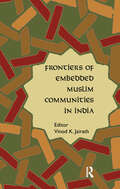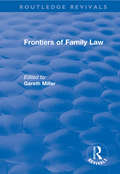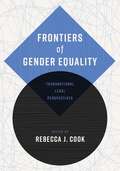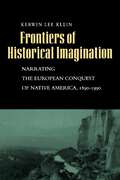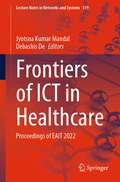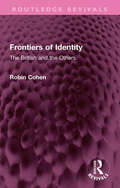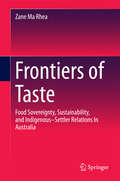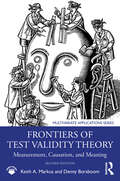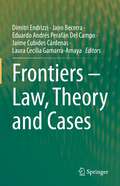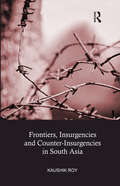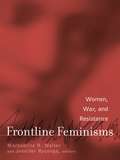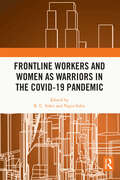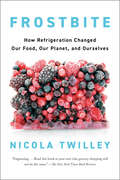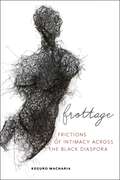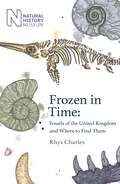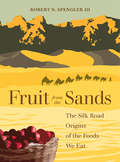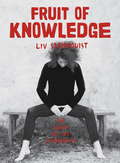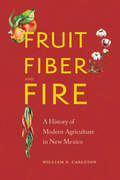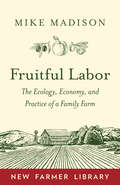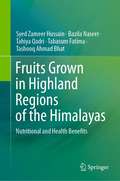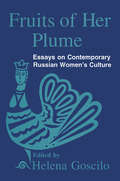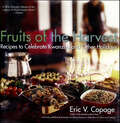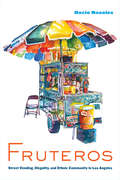- Table View
- List View
Frontiers of Embedded Muslim Communities in India
by Vinod K. JairathThis volume approaches the study of Muslim societies through an evolutionary lens, challenging Islamic traditions, identities, communities, beliefs, practices and ideologies as static, frozen or unchangeable. It assumes that there is neither a monolithic, essential or authentic Islam, nor a homogeneous Muslim community. Similarly, there are no fixed binary oppositions such as between the ulama and sufi saints or textual and lived Islam. The overarching perspective — that there is no fixity in the meanings of Islamic symbols and that the language of Islam can be used by individuals, organizations, movements and political parties variously in religious and non-religious contexts — underlies the ethnographically rich essays that comprise this volume. Divided in three parts, the volume cumulatively presents an initial framework for the study of Muslim communities in India embedded in different regional and local contexts. The first part focuses on ethnographies of three Muslim communities (Kuchchhi Jatt, Irani Shia and Sidis) and their relationships with others, with shifting borders and frontiers; part two examines the issue of ‘caste’ of certain Muslim communities; and the third part, containing chapters on Tamil Nadu, Andhra Pradesh, Mumbai and Gujarat, looks at the varied responses of Muslims as Indian citizens in regional contexts at different historical moments. Although the volume focuses on Muslim communities in India, it is also meant to bridge an important gap in, and contribute to, the ‘sociology of India’ which has been organized and taught primarily as a sociology of Hindu society. The book will appeal to those in sociology, history, political science, education, modern South Asian Studies, and to the general reader interested in India & South Asia.
Frontiers of Family Law
by Gareth MillerThis title was first published in 2003. The essays in this collection are written by academics and practitioners who look at some of the key aspects of family law. Papers include one from Lord Justice Ward, who gave the first judgement in the Court of Appeal on the case of the conjoined twins from Malta, another from Judge Pearl who has been responsible for training the judiciary on the impact of the Human Rights Act on family law, while Dr C. Ball contributes a paper on aspects of the 1989 Children Act. Parent and child contact across borders is dealt with in a paper by William Duncan, who is Deputy Director General of the Hague Conference. Other topics include medical evidence in child cases, pre-nuptial agreements and the re-establishing of contact after divorce.
Frontiers of Gender Equality: Transnational Legal Perspectives (Pennsylvania Studies in Human Rights)
by Rebecca J. CookIn Frontiers of Gender Equality, editor Rebecca Cook enlarges the chorus of voices to introduce new and different discourses about the wrongs of gender discrimination and to explain the multiple dimensions of gender equality. This volume demonstrates that the wrongs of discrimination can best be understood from the perspective of the discriminated, and that gender discrimination persists and grows in new and different contexts, widening the gap between the principle of gender equality and its realization, particularly for subgroups of women and LGBTQ+ peoples.Frontiers of Gender Equality provides retrospective views of the struggles to eliminate gender discrimination in national courts and international human rights treaties. Focusing on gender equality enables comparisons and contrasts among these regimes to better understand how they reinforce gender equality norms. Different regional and international treaties are examined, those in the forefront of advancing gender equality, those that are promising but little known, and those whose focus includes economic, social, and cultural rights, to explore why some struggles were successful and others less so. The book illustrates how gender discrimination continues to be normalized and camouflaged, and how it intersects with other axes of subordination, such as indigeneity, religion, and poverty, to create new forms of intersectional discrimination.With the benefit of hindsight, the book’s contributors reconstruct gender equalities in concrete situations. Given the increasingly porous exchanges between domestic and international law, various national, regional, and international decisions and texts are examined to determine how better to breathe life into equality from the perspectives, for instance, of Indigenous and Muslim women, those who were violated sexually and physically, and those needing access to necessary health care, including abortion. The conclusion suggests areas of future research, including how to translate the concept of intersectionality into normative and institutional settings, which will assist in promoting the goals of gender equality.
Frontiers of Historical Imagination: Narrating the European Conquest of Native America, 1890-1990
by Kerwin Lee KleinThe American frontier, a potent symbol since Europeans first stepped ashore on North America, serves as the touchstone for Kerwin Klein's analysis of the narrating of history. Klein explores the traditions through which historians, philosophers, anthropologists, and literary critics have understood the story of America's origin and the way those understandings have shaped and been shaped by changing conceptions of history. The American West was once the frontier space where migrating Europe collided with Native America, where the historical civilizations of the Old World met the nonhistorical wilds of the New. It was not only the cultural combat zone where American democracy was forged but also the ragged edge of History itself, where historical and nonhistorical defied and defined each other. Klein maintains that the idea of a collision between people with and without history still dominates public memory. But the collision, he believes, resounds even more powerfully in the historical imagination, which creates conflicts between narration and knowledge and carries them into the language used to describe the American frontier. In Klein's words, "We remain obscurely entangled in philosophies of history we no longer profess, and the very idea of 'America' balances on history's shifting frontiers."
Frontiers of ICT in Healthcare: Proceedings of EAIT 2022 (Lecture Notes in Networks and Systems #519)
by Debashis De Jyotsna Kumar MandalThe book includes original unpublished contributions presented at the Seventh International Conference on Emerging Applications of Information Technology (EAIT 2022), organized by Computer Society of India, Kolkata, Chapter during March 30–31, 2022. The book covers the topics such as image processing for smart healthcare applications, computer vision and pattern recognition for health care, Internet of Health Things, 5G and beyond in smart health care for sustainable cities.
Frontiers of Identity: The British and the Others (Routledge Revivals)
by Robin CohenOriginally published in 1994, this book considers one of the enduring themes of social science. How is a national identity forged and sustained? How does it change over time? Who is included in the body politic and who is socially excluded? How do the established population, opinion-makers and politicians react to more marginal people, including long-spurned minorities and recent migrants?This original analysis shows how the British as a people are constantly defined and redefined through their interactions with several ‘frontiers of identity’, namely Celts, expatriates, Americans, Europeans, citizens of the Commonwealth and more crucially with ‘aliens’. The alien-British relationship is particularly loaded with uneasiness, aversion and hostility. ‘Aliens’ a category created by what the author calls ‘the frontier guards’ of British identity, are frequently deported or detained. Their sanctuaries are invaded, their legal and humanitarian claims for asylum minutely examined and often denied. This searching exploration of these processes shows how the meaning of who one is depends crucially on who one rejects.Drawing on a wealth of historical scholarship, research compiled at the time of the original publication and contemporary social theory and now reissued with a new Preface this book exposes the unstated assumptions and hidden meanings in the relationship between the ‘British’ and ‘the others'. It uncovers how the British and their rulers seek to reshape their national identity in a difficult period of post-imperial adjustment, relative economic decline and the European integration of the 1990s.The book will be of use to students of sociology, politics, history and European studies.
Frontiers of Taste
by Zane Ma RheaThis book provides a critical, multiperspective, sociohistorical analysis of the role of food in postcolonial Indigenous, British and French settler relations. Drawing on archival resources from Australian explorers, settlers and nation builders, the book argues that contemporary issues of food security, sovereignty and sustainability have been significantly shaped by the colonial impact on human foodways. The author goes on to enhance readers' understanding of how contact between inhabitants and newcomers was shaped and informed by food, and how these engagements established a modus vivendi that carries through to the present day. Based on the assessment of archival records, it uses a comparative, socio-historical lens to investigate contact between Indigenous and non-Indigenous people where the exchange of food or knowledge about food took place. It finds that the transfer of food and food knowledge was multifaceted, and the flow of food knowledge occurred in both directions, although these exchanges were neither symmetrical nor balanced. It also analyzes and discusses food as a focal point of activity. The final chapter offers an assessment of the potential for the development of a sustainable, nutritious, tasty Australian cuisine that moves beyond the tropes and stereotypical narratives embedded into colonial Indigenous-settler relations in the context of food. If this was accepted by all Australians, it would allow opportunities to be created for Indigenous Australians to develop food products for the market that are sustainable, economically viable and developed in ways that are culturally appropriate.
Frontiers of Test Validity Theory: Measurement, Causation, and Meaning (Multivariate Applications Series)
by Keith A. Markus Denny BorsboomNow in its second edition, this important book examines test validity in the behavioral, social, and educational sciences by exploring three fundamental problems: measurement, causation, and meaning. Psychometric and philosophical perspectives and unresolved issues receive attention, as the authors explore how measurement is conceived from both the classical and modern perspectives.Split into three accessible sections, the first contrasts theories of measurement as applied to the validity of behavioral science measures, and the second considers causal theories of measurement as well as alternative theories of causation. The final section explores the meaning and interpretation of test scores as they apply to test validity, offering a conceptual overview of the field and its current state. Each carefully revised chapter begins with an overview of key theories and literature, concludes with a list of suggested readings, and features boxes with real-life situations that connect theory to practice. Examples of specific issues include: How tests can assess an attribute without measuring it. The role of values in test validity. Interpreting responses to the same question in different languages. Researchers, practitioners, and policy makers interested in test validity or developing tests will appreciate the book's cutting-edge review of test validity. Focusing on both the underlying concepts, as well as practical challenges of test construction and use, it also serves as a supplement in graduate or advanced undergraduate courses on test validity, psychometrics, testing, or measurement taught in psychology, education, sociology, social work, political science, business, criminal justice, and other fields. The book does not assume a background in measurement.
Frontiers – Law, Theory and Cases
by Dimitri Endrizzi Jairo Becerra Eduardo Andrés Perafán Del Campo Jaime Cubides Cárdenas Laura Cecilia Gamarra-AmayaThis book focuses on current frontier-related issues such as humanitarian crises, economic crises, discrimination of migrants in certain countries, different typologies of borders such as land, maritime, air, space, and even cyberspace borders, and environmental protection of water resources at borders. It addresses legal and theoretical considerations and presents empirical cases showing the manifestations of the concept in the real world and its dynamics. Without claiming to exhaust the debate on frontiers, especially given the breadth of the subject and the large number of viewpoints from which the phenomenon can be examined, this book intends to be a helpful source of insights for academics, university students, and others who wish to explore the complex and multifaceted worlds that emerge, particularly in a globalized society, from the interaction between the various actors and scenarios that shape the reality of frontiers.
Frontiers, Insurgencies and Counter-Insurgencies in South Asia
by Kaushik RoyThis book uses cross-cultural analysis across Eurasia and Afro-Asia to trace the roots of contemporary border disputes and insurgencies in South Asia. It discusses the way frontiers of British India, and consequently the modern states of India and Pakistan, were drafted through negotiations backed up by organized violence, showing how this conce
Frontline Feminisms: Women, War, and Resistance (Gender, Culture and Global Politics)
by Jennifer Rycenga Marguerite R. WallerFirst published in 2001. Routledge is an imprint of Taylor & Francis, an informa company.
Frontline Workers and Women as Warriors in the Covid-19 Pandemic
by R. C. Sobti Vipin SobtiThe Covid-19 Pandemic disrupted lives across borders and created unprecedented pressures on the health and medical infrastructure. Frontline workers were at the forefront in handling efforts to curb its devastating effects on people’s lives. This volume looks at various challenges frontline workers and women, working tirelessly both in the privacy of homes as well as professionals in public spaces faced and their immense contribution to managing the pandemic. It examines the psycho-social and health implications the pandemic and its fallout has had on the professions and personal lives of healthcare workers, sanitary workers, police, teachers, household helps, sex workers, volunteers among others. Analysing the vulnerabilities and the adaptability of nursing personnel, doctors and administrators, it also offers suggestions for rebooting health-care systems and for putting in place support-systems to mitigate the adverse gendered impacts of the lockdowns and the spread of the disease. Comprehensive and insightful, with essays from experts in different fields, this book will be of interest to students and researchers of public health, health care management, gender studies, public policy making, sociology, economics.
Frostbite: How Refrigeration Changed Our Food, Our Planet, and Ourselves
by Nicola TwilleyWinner of the James Beard Award for Literary Writing "Engrossing...hard to put down." — The New York Times Book Review&“Frostbite is a perfectly executed cold fusion of science, history, and literary verve . . . as a fellow nonfiction writer, I bow down. This is how it's done.&” — Mary Roach, author of Fuzz and StiffAn engaging and far-reaching exploration of refrigeration, tracing its evolution from scientific mystery to globe-spanning infrastructure, and an essential investigation into how it has remade our entire relationship with food—for better and for worseHow often do we open the fridge or peer into the freezer with the expectation that we&’ll find something fresh and ready to eat? It&’s an everyday act—but just a century ago, eating food that had been refrigerated was cause for both fear and excitement. The introduction of artificial refrigeration overturned millennia of dietary history, launching a new chapter in human nutrition. We could now overcome not just rot, but seasonality and geography. Tomatoes in January? Avocados in Shanghai? All possible.In Frostbite, New Yorker contributor and cohost of the award-winning podcast Gastropod Nicola Twilley takes readers on a tour of the cold chain from farm to fridge, visiting off-the-beaten-path landmarks such as Missouri&’s subterranean cheese caves, the banana-ripening rooms of New York City, and the vast refrigerated tanks that store the nation&’s orange juice reserves. Today, nearly three-quarters of everything on the average American plate is processed, shipped, stored, and sold under refrigeration. It&’s impossible to make sense of our food system without understanding the all-but-invisible network of thermal control that underpins it. Twilley&’s eye-opening book is the first to reveal the transformative impact refrigeration has had on our health and our guts; our farms, tables, kitchens, and cities; global economics and politics; and even our environment.In the developed world, we&’ve reaped the benefits of refrigeration for more than a century, but the costs are catching up with us. We&’ve eroded our connection to our food and redefined what &“fresh&” means. More important, refrigeration is one of the leading contributors to climate change. As the developing world races to build a US-style cold chain, Twilley asks: Can we reduce our dependence on refrigeration? Should we? A deeply researched and reported, original, and entertaining dive into the most important invention in the history of food and drink, Frostbite makes the case for a recalibration of our relationship with the fridge—and how our future might depend on it.
Frottage: Frictions of Intimacy across the Black Diaspora (Sexual Cultures #11)
by Keguro MachariaWinner, 2020 Alan Bray Memorial Prize, given by the GL/Q Caucus of the Modern Language AssociationA new understanding of freedom in the black diaspora grounded in the erotic In Frottage, Keguro Macharia weaves together histories and theories of blackness and sexuality to generate a fundamentally new understanding of both the black diaspora and queer studies. Macharia maintains that to reach this understanding, we must start from the black diaspora, which requires re-thinking not only the historical and theoretical utility of identity categories such as gay, lesbian, and bisexual, but also more foundational categories such as normative and non-normative, human and non-human. Simultaneously, Frottage questions the heteronormative tropes through which the black diaspora has been imagined. Between Frantz Fanon, René Maran, Jomo Kenyatta, and Claude McKay, Macharia moves through genres—psychoanalysis, fiction, anthropology, poetry—as well as regional geohistories across Africa and Afro-diaspora to map the centrality of sex, gender, desire, and eroticism to black freedom struggles. In lyrical, meditative prose, Macharia invigorates frottage as both metaphor and method with which to rethink diaspora by reading, and reading against, discomfort, vulnerability, and pleasure.
Frozen in Time: Fossils of the United Kingdom and Where to Find Them
by Rhys CharlesA vibrant and richly detailed guide to fossils for readers with a passion for the natural world and those that inhabited it long ago.This is a book for those that want to learn to scan the beach for fossils, who love the simple pleasure of getting outside or those who want to develop their relationship with the world around them. From the Jurassic Coast to the Antrim Coast, our nation is home to some of the most incredible fossil sites in the world.Weaving an intricate tapestry of knowledge on the landscape of our own pre-historic planet, palaeontologist and Education Officer of the Bristol Dinosaur Project, Rhys Charles beautifully communicates the joy of fossil-hunting and where best to hunt for them in the country. Under his guidance, and with The Natural History Museum, this book invites readers to unlock breath-taking fragments of a lost world.
Frozen in Time: Fossils of the United Kingdom and Where to Find Them
by Rhys CharlesA vibrant and richly detailed guide to fossils for readers with a passion for the natural world and those that inhabited it long ago.This is a book for those that want to learn to scan the beach for fossils, who love the simple pleasure of getting outside or those who want to develop their relationship with the world around them. From the Jurassic Coast to the Antrim Coast, our nation is home to some of the most incredible fossil sites in the world.Weaving an intricate tapestry of knowledge on the landscape of our own pre-historic planet, palaeontologist and Education Officer of the Bristol Dinosaur Project, Rhys Charles beautifully communicates the joy of fossil-hunting and where best to hunt for them in the country. Under his guidance, and with The Natural History Museum, this book invites readers to unlock breath-taking fragments of a lost world.
Fruit from the Sands: The Silk Road Origins of the Foods We Eat
by Robert N. Spengler IIIThe foods we eat have a deep and often surprising past. From almonds and apples to tea and rice, many foods that we consume today have histories that can be traced out of prehistoric Central Asia along the tracks of the Silk Road to kitchens in Europe, America, China, and elsewhere in East Asia. The exchange of goods, ideas, cultural practices, and genes along these ancient routes extends back five thousand years, and organized trade along the Silk Road dates to at least Han Dynasty China in the second century BC. Balancing a broad array of archaeological, botanical, and historical evidence, Fruit from the Sands presents the fascinating story of the origins and spread of agriculture across Inner Asia and into Europe and East Asia. Through the preserved remains of plants found in archaeological sites, Robert N. Spengler III identifies the regions where our most familiar crops were domesticated and follows their routes as people carried them around the world. With vivid examples, Fruit from the Sands explores how the foods we eat have shaped the course of human history and transformed cuisines all over the globe.
Fruit of Knowledge
by Liv Strömquist'How I loved reading Fruit of Knowledge ... Clever, angry, funny and righteous, also informative to an eye-popping degree' Rachel Cooke, OBSERVER GRAPHIC NOVEL OF THE MONTHFrom Adam and Eve to pussy hats, people have punished, praised, pathologised and politicised vulvas, vaginas, clitorises, and menstruation. In the international bestseller Fruit of Knowledge, celebrated Swedish cartoonist Liv Strömquist traces how different cultures and traditions have shaped women's health and beyond. Her biting, informed commentary and ponytailed avatar guides the reader from the darkest chapters of history (a clitoridectomy performed on a five-year-old American child as late as 1948) to the lightest (vulvas used as architectural details as a symbol of protection). Like Alison Bechdel and Jacky Fleming, she uses the comics medium to reveal uncomfortable truths about how far we haven't come.'Just the thing for all the feminists in your life' Observer Books of the Year'This book made me laugh in public (and also cry a little). It is the book I gave to my younger sister the next time I saw her because of its anger and brilliance and because it is an overwhelming source of knowledge about things we should all already know' Daisy Johnson, author of the Man Booker Prize-shortlisted Everything Under 'There are moments of genuine hilarity, as when Strömquist pictures the dinner party chatter of men living under a matriarchy, and others of fierce anger in this wild, witty and vital book' Observer Books of the Year
Fruit, Fiber, and Fire: A History of Modern Agriculture in New Mexico
by William R. CarletonFor much of the twentieth century, modernization did not simply radiate from cities into the hinterlands; rather, the broad project of modernity, and resistance to it, has often originated in farm fields, at agricultural festivals, and in agrarian stories. In New Mexico no crops have defined the people and their landscape in the industrial era more than apples, cotton, and chiles. In Fruit, Fiber, and Fire William R. Carleton explores the industrialization of apples, cotton, and chiles to show how agriculture has affected the culture of twentieth-century New Mexico. The physical origins, the shifting cultural meanings, and the environmental and market requirements of these three iconic plants all broadly point to the convergence in New Mexico of larger regions—the Mexican North, the American Northeast, and the American South—and the convergence of diverse regional attitudes toward industry in agriculture. Through the local stories that represent lives filled with meaningful struggles, lessons, and successes, along with the systems of knowledge in our recent agricultural past, Carleton provides a history of the broader culture of farmers and farmworkers. In the process, seemingly mere marginalia—a farmworker&’s meal, a small orchard&’s advertisement campaign, or a long-gone chile seed—add up to an agricultural past with diverse cultural influences, many possible futures, and competing visions of how to feed and clothe ourselves that remain relevant as we continue to reimagine the crops of our future.
Fruitful Labor: The Ecology, Economy, and Practice of a Family Farm
by Mike Madison"Instead of taking us through his work, season by season, crop by crop--the narrative approach--Madison explores his farm and its methods analytically, from many overlapping angles. The result is profoundly interesting."—The New York Review of BooksAs the average age of America&’s farmers continues to rise, we face serious questions about what farming will look like in the near future, and who will be growing our food. Many younger people are interested in going into agriculture, especially organic farming, but cannot find affordable land, or lack the conceptual framework and practical information they need to succeed in a job that can be both difficult and deeply fulfilling.In Fruitful Labor, Mike Madison meticulously describes the ecology of his own small family farm in the Sacramento Valley of California. He covers issues of crop ecology such as soil fertility, irrigation needs, and species interactions, as well as the broader agroecological issues of the social, economic, regulatory, and technological environments in which the farm operates. The final section includes an extensive analysis of sustainability on every level.Pithy, readable, and highly relevant, this book covers both the ecology and the economy of a truly sustainable agriculture. Although Madison&’s farm is unique, the broad lessons he has gleaned from his more than three decades as an organic farmer will resonate strongly with the new generation of farmers who work the land, wherever they might live.This book is part of Chelsea Green Publishing&’s NEW FARMER LIBRARY series, where we collect innovative ideas, hard-earned wisdom, and practical advice from pioneers of the ecological farming movement—for the next generation. The series is a collection of proven techniques and philosophies from experienced voices committed to deep organic, small-scale, regenerative farming. Each book in the series offers the new farmer essential tips, inspiration, and first-hand knowledge of what it takes to grow food close to the land.
Fruits Grown in Highland Regions of the Himalayas: Nutritional and Health Benefits
by Syed Zameer Hussain Bazila Naseer Tahiya Qadri Tabasum Fatima Tashooq Ahmad BhatThis book discusses different fruit crops and provides first-hand information on the nutritional composition of commercially important, as well as unexplored fruits, which are grown in Jammu, Kashmir and Ladakh. A detailed nutritional profile of each fruit is presented in the book. The potential health implications against cardiovascular diseases, diabetes, carcinoma, oxidative damage, asthma, aging and cognition are discussed and explained. Besides, nutritional composition and medicinal implications, origin, morphology, taxonomy and production scenarios of unexplored, as well as commercially important fruits, have also been highlighted in the book. This book will be of interest to students and researchers involved in agricultural sciences, food science, nutrition and the Indian medicine system.
Fruits of Her Plume: Essays on Contemporary Russian Women's Culture
by Helena GosciloThe 1980s witnessed the ascendency of Russian women in multiple spheres of artistic creation, including literature, film, and painting. This volume may thus be said to engage not only women's artistic production but, indeed, the best and most colourful of recent Russian culture. Treating contemporary Russian women's creativity, it approaches women's texts, films, and canvasses from a range of perspectives, from anti-gendered to feminist. Some of the essays introduce writers not previously well studied, others challenge conventional interpretations and assumptions, while still others yield original viewpoints through novel juxtapositions. In addition to offering insights into the various artists under analysis, the essays map the wide terrain of issues and methodologies proliferating in cultural criticism today, and mirror the diversity that is one of the most appealing features of women's creativity in contemporary Russia.
Fruits of the Harvest: Recipes to Celebrate Kwanzaa and Other Holidays
by Eric V. CopageFruits of the Harvest: Recipes to Celebrate Kwanzaa and Other Holidays offers more than 125 treasured recipes from people of African descent all over the world: Jerked Pork Chops and Fresh Papaya Chutney from Jamaica; New-Fashioned Fried Chicken, a dish from the Deep South; and Tiebou Dienne, Senegalese herb-stuffed fish steaks with seasoned rice. In addition to main courses, there are recipes for a full range of dishes, from appetizers to soups, salads, side dishes, vegetables, breads, beverages, and, of course, desserts. Fried Okra, Antiguan Pepper Pot, Ambrosia Salad and Potato Salad, Garlic-Chedder Grits Soufflé, Caipirinha, and Sweet Potato Tarts in Peanut Butter Crusts are but a few of the delights featured here.And along the way, learn about African American culture, including the seven principles of Kwanzaa and how people of African descent all across the globe celebrate the best their cultures have to offer through food and communion. Fruits of the Harvest: Recipes to Celebrate Kwanzaa and Other Holidays isn't just a cookbook -- it's a source of inspiration for the most extravagant of holiday gatherings as well as for a simple Sunday dinner.
Fruteros: Street Vending, Illegality, and Ethnic Community in Los Angeles
by Rocío RosalesThis book examines the social worlds of young Latino street vendors as they navigate the complexities of local and federal laws prohibiting both their presence and their work on street corners. Known as fruteros, they sell fruit salads out of pushcarts throughout Los Angeles and are part of the urban landscape. Drawing on six years of fieldwork, Rocío Rosales offers a compelling portrait of their day-to-day struggles. In the process, she examines how their paisano (hometown compatriot) social networks both help and exploit them. Much of the work on newly arrived Latino immigrants focuses on the ways in which their social networks allow them to survive. Rosales argues that this understanding of ethnic community simplifies the complicated ways in which social networks and social capital work. Fruteros sheds light on those complexities and offers the concept of the "ethnic cage" to explain both the promise and pain of community.
